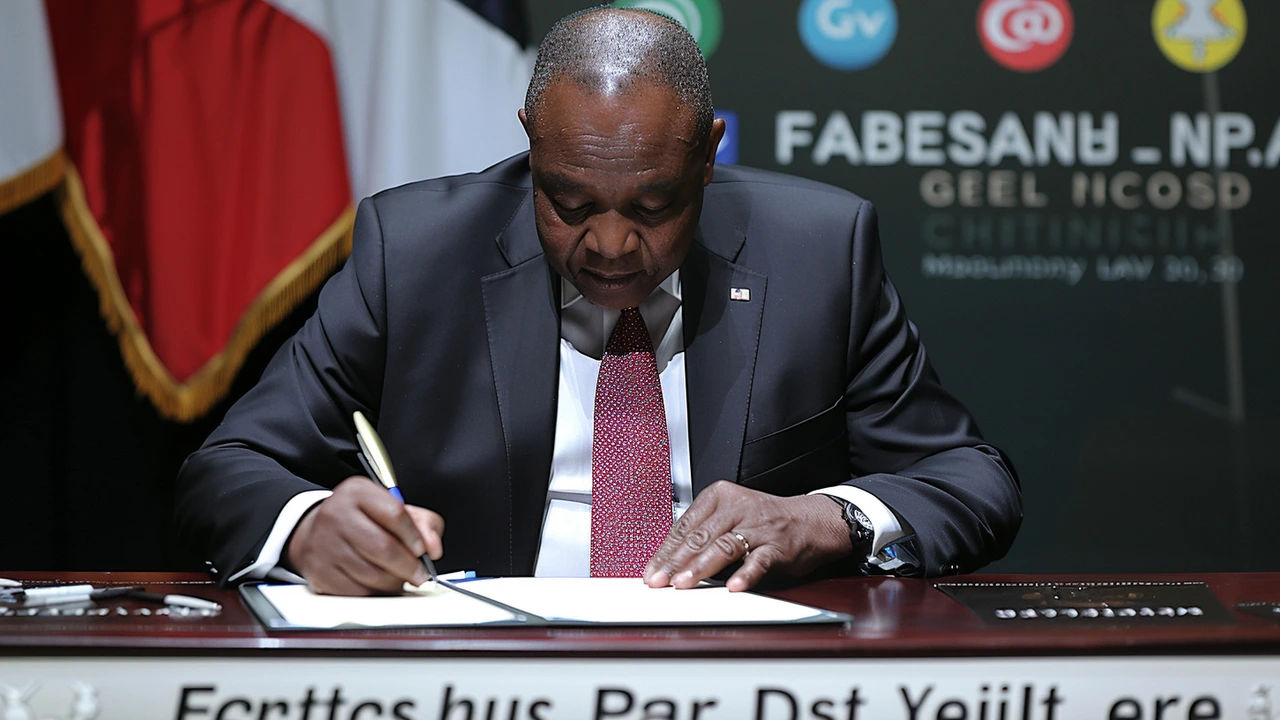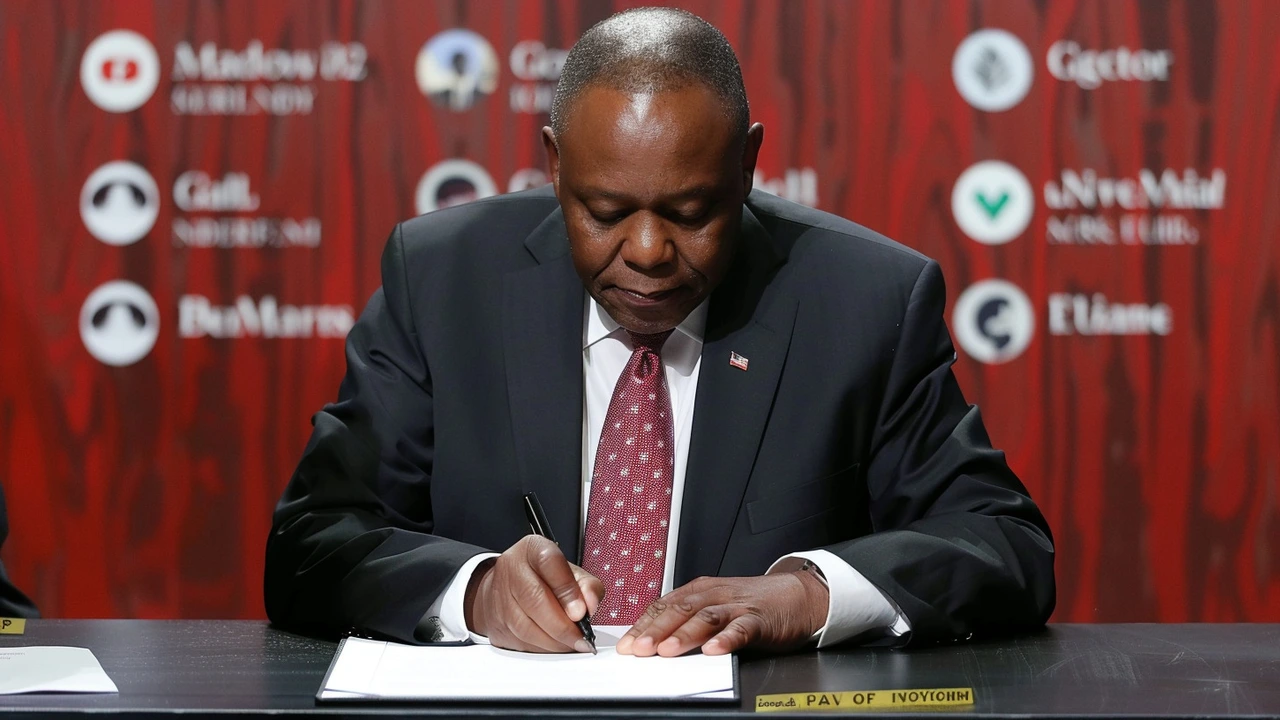President Ramaphosa Enacts Groundbreaking Legislation to Combat Gender-Based Violence in South Africa

Significant Legislative Actions Taken by President Ramaphosa
On May 24, 2024, a landmark event took place at the Union Buildings in Pretoria. South African President Cyril Ramaphosa signed into law two crucial bills: the National Council on Gender-Based Violence (GBV) and Femicide Bill, and the National Prosecuting Authority (NPA) Amendment Bill. This important ceremony marks a pivotal moment in South Africa's ongoing struggle to combat the scourge of gender-based violence and femicide, which continue to be pressing issues in the nation.
The National Council on Gender-Based Violence and Femicide Bill
The National Council on Gender-Based Violence and Femicide Bill aims to provide a more systematic and coordinated approach to combating gender-based violence. By establishing a council specifically tasked with overseeing the country's response, the bill ensures that efforts to address the issue are thorough, continuous, and effective. This council will serve as a cornerstone in the fight against GBV, coordinating between different government departments, civil society, and international partners to address both the immediate and root causes of violence.
This approach aims to secure a society where women, children, and all vulnerable groups can live without fear. It combines legal frameworks, community engagement, support systems for survivors, and robust prevention measures. By integrating a variety of stakeholders into the process, the council hopes to craft solutions that are holistic and durable.
The National Prosecuting Authority Amendment Bill
The second piece of legislation, the National Prosecuting Authority Amendment Bill, seeks to enhance the capacity of the National Prosecuting Authority to deal with not only gender-based violence but also other serious crimes. By providing the NPA with additional resources and tools, the bill aims to ensure that perpetrators of gender-based violence and femicide are brought to justice swiftly and effectively. This legislative action reinforces the government’s commitment to upholding the rule of law and protecting its citizens from harm.
The NPA has faced criticism in the past for its perceived inefficiencies and delays in prosecuting cases of GBV. This bill addresses those concerns directly by potentially increasing staffing, providing ongoing training for prosecutors, and improving investigative processes. The objective is to create a justice system that is responsive, efficient, and equipped to handle the complexities involved in gender-based violence cases.

A Milestone in South Africa's Fight Against GBV and Femicide
Gender-based violence and femicide have been pervasive issues in South Africa, often described as a shadow pandemic alongside the global COVID-19 crisis. The signing of these bills is seen as a beacon of hope for many advocates and survivors who have long called for stronger action and better protective measures. South Africa has one of the highest rates of gender-based violence in the world, and these legislative actions are crucial steps towards reversing this grim statistic.
The significance of these laws cannot be overstated. By turning these bills into law, President Ramaphosa is not just acknowledging the severity of gender-based violence but also making a firm commitment to tackling it head-on. The ceremony was attended by various dignitaries, members of civil society, and survivors of gender-based violence, all of whom expressed a mixture of relief and cautious optimism about the future.
A Broader Impact on Society
The expected impact of these laws on South African society is profound. Not only do they offer a more structured framework for preventing and responding to gender-based violence, but they also set a precedent for other countries grappling with similar issues. South Africa's approach can serve as a model for nations worldwide, showcasing how comprehensive legislation and coordinated efforts can lead to substantial societal change.
However, the journey doesn't end here. Implementing these laws effectively will require sustained effort from all sectors of society. Continuous monitoring, evaluation, and adaptation of strategies will be essential to ensure that the goals of these bills are realized in practice. Advocacy groups urge that the focus should now shift to the practical aspects of implementation, ensuring that the theoretical framework laid out by these laws translates into real-world action and results.

Next Steps and Call to Action
Looking ahead, the government plans to roll out a series of initiatives to support the implementation of these laws. This includes public awareness campaigns, educational programs, and the establishment of support structures for survivors. These efforts aim to foster an environment where gender-based violence is not just addressed in reactionary terms but is actively prevented through societal change.
President Ramaphosa's enactment of the National Council on Gender-Based Violence and Femicide Bill and the National Prosecuting Authority Amendment Bill undoubtedly marks a significant milestone in South Africa's journey to eradicate gender-based violence and femicide. It embodies a crucial shift towards a more cohesive and systematic approach to addressing these issues, providing hope for a safer and more equitable future for all South Africans.
Wow, finally something that actually tackles the nightmare that has haunted South Africa for far too long.
Ramaphosa’s move feels like a dramatic plot twist in a saga we’ve all been living through.
These bills could finally give survivors a voice that isn’t constantly drowned out.
But let’s be real, the real battle will be in the streets and courtrooms, not just in the ink on paper.
We need the government to back these promises with money, training, and unflinching prosecution.
If they pull it off, it could be a game‑changer for the whole continent.
so much hope rite there!
Oh great, another set of laws that will definitely solve a deep‑seated social crisis overnight.
Because legislation has a flawless track record of eradicating gender‑based violence, right?
Sure, the National Council will “coordinate” everything – as if bureaucracy ever moves fast.
And the NPA amendment? Let’s hope the extra resources aren’t just a fancy footnote in a press release.
You can almost hear the gears turning, but the victims are still waiting.
Maybe the real victory will be a photo op and a few applause emojis.
We’ll see if the implementation lives up to the hype.
Honestly, it’s a solid step forward and something we can all root for.
The council could bring together NGOs, community leaders, and police in ways we haven’t seen before.
If they actually listen to survivors, we might finally get some real change.
Let’s keep the conversation alive and hold them accountable.
The introduction of these statutes represents a commendable advancement in South Africa's legal framework.
By establishing a dedicated council, the government ensures systematic oversight of gender‑based violence initiatives.
The amendment to the NPA equips prosecutors with necessary tools to expedite justice.
This approach aligns with international best practices and should serve as a model for other nations.
It is imperative that the execution matches the legislative intent.
looks solid but need real action not just words
President Cyril Ramaphosa’s enactment of the National Council on Gender‑Based Violence and Femicide Bill, together with the amendment to the National Prosecuting Authority, constitutes a pivotal legislative development in the ongoing struggle against gender‑based violence within the Republic of South Africa.
The establishment of a dedicated council signifies a strategic shift toward a coordinated and multidisciplinary response, integrating governmental departments, civil society organizations, and international partners.
Such structural integration is essential for addressing both the immediate protection of survivors and the long‑term prevention of violence.
Moreover, the amendment to the NPA promises to bolster prosecutorial capacity, thereby reducing the historically persistent delays that have undermined public confidence in the justice system.
This dual approach of policy coordination and enhanced legal enforcement reflects an awareness of the complex socio‑legal dynamics that underlie gender‑based offences.
Empirical evidence from comparable jurisdictions demonstrates that when legislative intent is matched by adequate resource allocation, measurable declines in incidence rates can be achieved.
Consequently, the success of these bills will depend heavily on sustained funding, rigorous training programs for law‑enforcement personnel, and continuous monitoring mechanisms.
The involvement of survivor advocacy groups in the implementation phase will further ensure that the measures remain victim‑centered and culturally sensitive.
In addition, public education campaigns are indispensable for reshaping societal attitudes that tacitly condone violence.
These campaigns must be inclusive, linguistically appropriate, and disseminated across both urban and rural communities.
The anticipated ripple effect of South Africa’s legislative model may inspire analogous reforms throughout the African continent and beyond.
Nevertheless, vigilance is required to prevent bureaucratic inertia from stalling progress.
Stakeholders must therefore maintain a persistent dialogue with the council to evaluate outcomes and adjust strategies accordingly.
Ultimately, the passage of these laws offers a measure of hope, yet the realization of that hope hinges upon concrete, on‑the‑ground action.
It is incumbent upon all sectors of society to collaborate in translating statutory intent into tangible safety for women and vulnerable populations.
Implementation must be monitored rigorously to ensure these provisions achieve their intended impact.